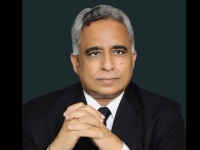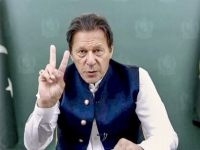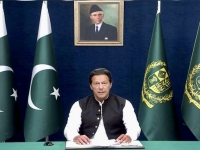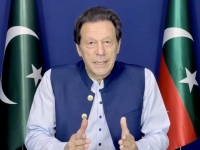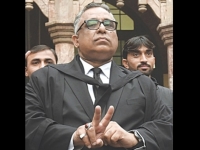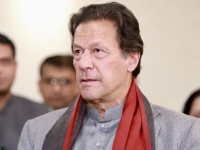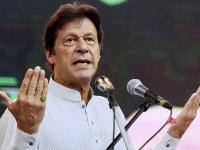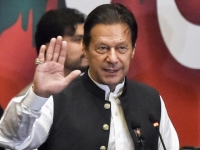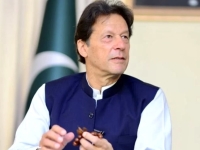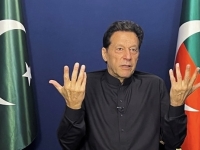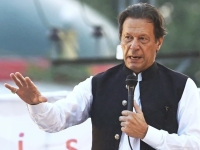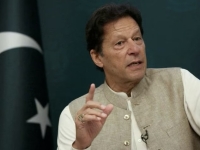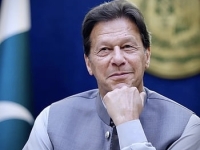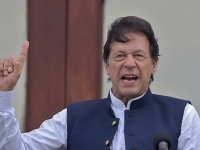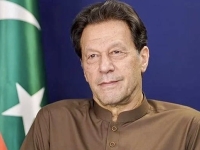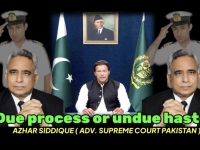Politics
So, the impugned judgement dated 05.08.2023 should be set aside
Due process or undue haste .....?
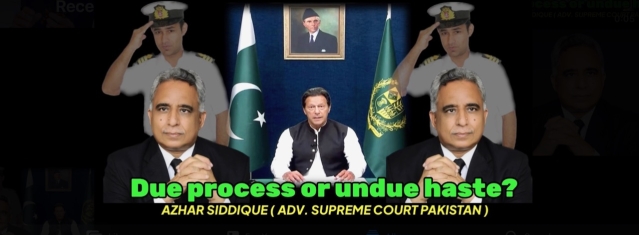
A (Source: Ak)
USPA NEWS -
Imran Khan, the former prime minister of Pakistan and PTI chief, has faced a recent setback with a trial court sentencing him to three years in prison and disqualifying him for five years due to allegedly false declarations about his assets.?However, it is essential to carefully consider the details of this case and assess whether the verdict was fair and lawful. This article aims to shed light on the flaws in the trial court’s handling of Imran Khan’s case and to emphasise the importance of due process.
?The way PTI chief’s trial was conducted is a big question mark on his right to fair trial and due process. In violation of Article 10A of the Constitution of the Islamic Republic of Pakistan, 1973 which guarantees an absolute and unqualified right to a fair trial and due process, this fundamental right was abridged by not allowing him to defend the case, get an adequate opportunity to prepare the defense, and to get his right to hear the proceedings before an independent and impartial court.?Under the rules governing Toshakhana, government officials can keep gifts if they have a low worth, while they must pay a reduced fee to the government for extravagant items.
?The way PTI chief’s trial was conducted is a big question mark on his right to fair trial and due process. In violation of Article 10A of the Constitution of the Islamic Republic of Pakistan, 1973 which guarantees an absolute and unqualified right to a fair trial and due process, this fundamental right was abridged by not allowing him to defend the case, get an adequate opportunity to prepare the defense, and to get his right to hear the proceedings before an independent and impartial court.?Under the rules governing Toshakhana, government officials can keep gifts if they have a low worth, while they must pay a reduced fee to the government for extravagant items.
Imran was accused of purchasing the gifts he received as prime minister at throwaway rates and of selling them in the open market for staggering profits. He was accused of misusing his 2018 to 2022 premiership to buy and sell gifts in state possession that had been received during visits abroad and worth over Rs140 million.?Against this legally allowed act, a reference was forwarded by National Assembly Speaker Raja Pervez Ashraf to the Election Commission of Pakistan (ECP). In October 2022, ECP declared him guilty of corrupt practices and filed a complaint in an Islamabad court. He was convicted and sentenced to three years in jail, along with a fine amounting to Rs100,000 on August 5, 2023.
Imran Khan’s faulty declaration of assets might be a material irregularity and not an act of corruption or corrupt practices. It is crucial to distinguish between these two concepts. The false allegations against Imran should not be equated to corrupt practices.
?Shortly after the verdict, Imran was arrested and sent to the famous Attock jail. The court also disqualified him for five years. In its verdict, the trial court said while filing Form-B for the financial year 2018-2019, Imran Khan had declared “four goats” as his assets but omitted to disclose the purchase and sale of precious Toshakhana gifts.?This may be a material irregularity, not corruption or corrupt practices, as declared by the court in its verdict. This analysis is also supported by Section 137(1) of the Election Act, 2017 which reads: “Every Member of an Assembly and Senate shall submit to the Commission, on or before 31st December each year, a copy of his statement of assets and liabilities including assets and liabilities of his spouse and dependent children as on the preceding thirtieth day of June on Form B.
?Shortly after the verdict, Imran was arrested and sent to the famous Attock jail. The court also disqualified him for five years. In its verdict, the trial court said while filing Form-B for the financial year 2018-2019, Imran Khan had declared “four goats” as his assets but omitted to disclose the purchase and sale of precious Toshakhana gifts.?This may be a material irregularity, not corruption or corrupt practices, as declared by the court in its verdict. This analysis is also supported by Section 137(1) of the Election Act, 2017 which reads: “Every Member of an Assembly and Senate shall submit to the Commission, on or before 31st December each year, a copy of his statement of assets and liabilities including assets and liabilities of his spouse and dependent children as on the preceding thirtieth day of June on Form B.
The absence of a clear definition of corrupt practices in section 137 of the Election Act, 2017 (Act) poses a challenge in determining the severity of each offense. Without proper guidelines, it becomes difficult to establish the nature of punishment accurately. This highlights the need for clearer legislation to avoid ambiguity in future cases.
Though there is no definition of corrupt practices in this provision, its subsection 4 makes it mandatory that the ECP should have initiated proceedings against Imran Khan within 120 days if there was a false statement of assets and liabilities in material particulars showing his corrupt practices.?Section 137(4) clearly states: “Where a Member submits the statement of assets and liabilities under this section which is found to be false in material particulars, he may, within one hundred and twenty days from the date submission of the statement, be proceeded against for committing the offence of corrupt practice.”?As far as the disqualification verdict announced by the election watchdog is concerned, under Article 204 of the Constitution, it is categorically provided that “Court” means the Supreme Court or a High Court.”
Though there is no definition of corrupt practices in this provision, its subsection 4 makes it mandatory that the ECP should have initiated proceedings against Imran Khan within 120 days if there was a false statement of assets and liabilities in material particulars showing his corrupt practices.?Section 137(4) clearly states: “Where a Member submits the statement of assets and liabilities under this section which is found to be false in material particulars, he may, within one hundred and twenty days from the date submission of the statement, be proceeded against for committing the offence of corrupt practice.”?As far as the disqualification verdict announced by the election watchdog is concerned, under Article 204 of the Constitution, it is categorically provided that “Court” means the Supreme Court or a High Court.”
This provision mandates that a tribunal must be responsible for declaring convictions and imposing disqualification for corrupt or illegal practices. However, ECP, which earlier handled Imran Khan’s case, was neither a court nor a tribunal. Therefore, also ECP’s verdict against Imran Khan was illegal and unlawful, lacking the authority to impose such severe penalties.?The provision of Article 175(2) of the Constitution categorically states that no Court shall have any jurisdiction save as or may be conferred by the Constitution or by or under any law. The Act does not confer any jurisdiction onto ECP to act as a Court or Tribunal.
?Being relevant in case of punishment, Section 174 of the Act reads: “Any person guilty of the offence of corrupt practice shall be punished with imprisonment for a term which may extend to three years or with fine which may extend to one hundred thousand rupees or with both.”
?Being relevant in case of punishment, Section 174 of the Act reads: “Any person guilty of the offence of corrupt practice shall be punished with imprisonment for a term which may extend to three years or with fine which may extend to one hundred thousand rupees or with both.”
Section 232 of the Act makes it mandatory that there must be a tribunal to declare conviction for any corrupt or illegal practice and five-year disqualification.?Regarding disqualification, Section 232 of the Act speaks: “Where a person has been convicted for any offence under this Act or has been found guilty of any corrupt or illegal practice by a Tribunal, he shall, if the Commission is of the view that circumstances so warrant and makes an order to that effect, be disqualified for such period not exceeding five years as may be specified in the order from being, or being elected as a Member of an Assembly, the Senate or a local government.”?Being neither a court nor tribunal, ECP arbitrarily adopted incorrect interpretations and went beyond its mandate. Various judgments have been passed by the superior courts declaring that ECP is not a Court of Law. A judgement, titled as, “P L D 2018 SC 189” says, “Undoubtedly, the ECP is not a Court or a Tribunal.”
Another judgement, titled as, 2021 SCMR 1675 says: “there is no power or jurisdiction inherent in the Commission itself in terms of Article 218(3) to consider the qualification/disqualification of a candidate/member, whether as an independent, standalone issue or as part of an election dispute.”?Thus, there is no declaration by a court of law to the effect that Imran Khan has failed to meet the requirements of Article 62(1) of the Constitution.?Even in case of disqualification under this Act, Imran Khan could not be declared disqualified as he had submitted his nomination papers from MIanwali constituency.?In addition, serious reservations surround the trial court’s handling of the Toshakhana case, indicating potential procedural flaws. It is essential to uphold the principles of due process to protect individuals’ rights and ensure a just legal system. The judge’s alleged disregard for proper procedure raises concerns about the fairness of the decision and its implications.
Interestingly, the trial court issued its verdict a day after the Islamabad High Court remanded the matter of maintainability of ECP’s complaint back to the trial court for “decision afresh.” There are other serious reservations too over the trial court’s handling of the Toshakhana case. The judge showed blatant disregard to the due process of law.?Outside of being hasty and compromised, the decision also shows procedural flaws and its serious implications.?Therefore, the PTI chief last Tuesday filed an appeal in the Islamabad High Court (IHC) challenging the trial court’s verdict and sentence against him seeking declaration of the judgement as illegal.?The court verdict is totally misdirected, failing to consider that for purposes of proving a criminal charge the mens rea (guilty mind) and actus reus (guilty act) is the responsibility of the prosecution, not the defendant. However, the prosecution has miserably failed to discharge its onus against Imran Khan. Therefore, the impugned judgement is unwarranted by law.?The verdict is based on hyper-technical grounds and misreading. The trial judge has given a finding of guilt against Khan on hyper-technical grounds.
The petition filed before the apex court too argues that not only was the judgement passed in haste, it was also declared in Khan’s absence and was “in complete disregard” of the directions of the Islamabad High Court (IHC).?Imran was convicted for concealing details of Toshakhana gifts under Section 174 of the Act, not for purchasing or selling gifts as there is no mentioning of purchase of items at cheaper rates and selling at increased prices to third person.
?So, the impugned judgement dated 05.08.2023 should be set aside, and the sentence passed be declared illegal and without lawful authority.?Also the disqualification verdict dated 21.10.2022 announced by ECP in the Toshakhana reference against Khan was illegal, unlawful, incompetent and without lawful authority.?Imposing severe penalties by the trial court without following proper legal procedure raises serious questions about the validity and fairness of the verdict.
Said : Mohammed AZHAR Siddique
( Advocate Supreme Court Pakistan )
London UK
10:53 GMT
by WhatsApp (Conv.)
more information: https://Aurangzeb
Liability for this article lies with the author, who also holds the copyright. Editorial content from USPA may be quoted on other websites as long as the quote comprises no more than 5% of the entire text, is marked as such and the source is named (via hyperlink).

